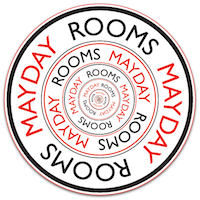MayDay Rooms is an archive, resource space and safe haven for social movements, experimental and marginal cultures and their histories. Our building in the centre of London contains an archive of historical material linked to social struggles, resistance campaigns, experimental culture, and the expression of marginalised and oppressed groups.
We offer organising and event space for activist and self-education groups, and run a full programme of events including film screenings, poetry readings, “scan-a-thons” for digitising archival material, historical talks, discussion and reading groups, and social nights – all free of charge!
Our archive opening hours are 11am – 6pm, Wednesday to Friday.
You can get a monthly bulletin of what’s coming up by signing up to our mailing list here, or by following us on social media:
What is MayDay Rooms' core work?
MayDay Rooms was established in 2014. Its aim is to safeguard histories and documents of radicalism and resistance by connecting them with contemporary struggle and protest, and by developing new free forms of dissemination and collective self-education. Our building offers communal spaces – a reading room, a meeting and screening room, a large kitchen, and a roof terrace – which are used by a wide range of cultural, political, and activist groups. The building is something of a melting pot, in which we hope a diverse range of groups can mix and get to know each other, while telling each other, documenting, and learning about our different histories. We hope it continues to be a place where people who want to break out of the present state of things can come together, work together, learn together, and struggle together.
The core work of MayDay Rooms is to activate radical and experimental historical material, primarily through collaborative education, informal research, digitisation and online distribution. We are actively collecting materials from people who have been involved in past (and present) social movements, actions and interventions, attempts to transform the world, or fights against the powerful. So if you have any historical materials you would be interested in depositing in the archive, or if you are interested in booking rooms for meetings or organising events, please get in touch at in-formation@maydayrooms.org
We proceed from the understanding that social change can happen most effectively when marginalised and oppressed groups can get to know – and tell – their own histories “from below.” Our archive focuses on social struggles, radical art, and acts of resistance from the 1960s to the present: it contains everything from recent feminist poetry to 1990s techno paraphernalia, from situationist magazines to histories of riots and industrial transformations, from 1970s educational experiments to prison writing. Our archival collections challenge the widespread assault on collective memory and the tradition of the oppressed. We aim to counter narratives of historical inevitability and political pessimism with living proof that many struggles continue.
Some documentation about MayDay Rooms’ formation can be found here.
How is MayDay Rooms run?
The building and archive is run by a small, non-hierarchical staff collective in collaboration with a number of resident groups called the Building Collective. Current Building Collective members include Cleaners and Allied Independent Workers Union, Statewatch, June Givanni Pan-African Cinema Archive, Industrial Workers of the World, Pagliacci Rossi, Autonomous Design, MayDay Rasio, Living Free and Brigata Ultra Clapton. More than twenty other activist, social justice, and educational groups frequently use the building for meetings and events. We also have a trustees board who supports our work and advice of direction and governance.
If you would like to get involved in the Building Collective or use one of our rooms you can find all our information here.
How is MayDay Rooms funded?
MayDay Rooms receives an annual grant of £50,000 from the Glass House Trust. The GHT support also extends to the provision of a four-storey building at 88 Fleet Street, which MDR occupies on a rolling, ten-year renewable lease. Our current operations run at a loss so we also apply for smaller project funds so that we can continue to organise and help maintain our building, keep our events free, activate our historical material, and facilitate a much-needed meeting place in central London in the spirit of solidarity.
We also have a friend scheme and all donations big or small are greatly appreciated
All PAYE staff are paid the same rate (£17.21 per hour), regardless of the type of labour. The size of our grant means the staff are all part time, and administrative and running costs are prioritised.
How can I get involved?
If you would like to further get involved at Mayday Rooms we welcome collaborations with like-minded projects and encourage critical as well as creative engagement with our archival material in relation to ongoing political and cultural struggles. So if you have any ideas for a project, intervention, publication, interruption, exhibition, event or anything else we might not have thought of, please get in touch please email in-formation [AT] maydayrooms.org.
Come and visit us!
Our archive opening hours are 10am – 6pm, Wednesday to Friday. Or come to one of our events! The building is also open for bookings for meetings Monday-Saturday from 10am – 10pm.
